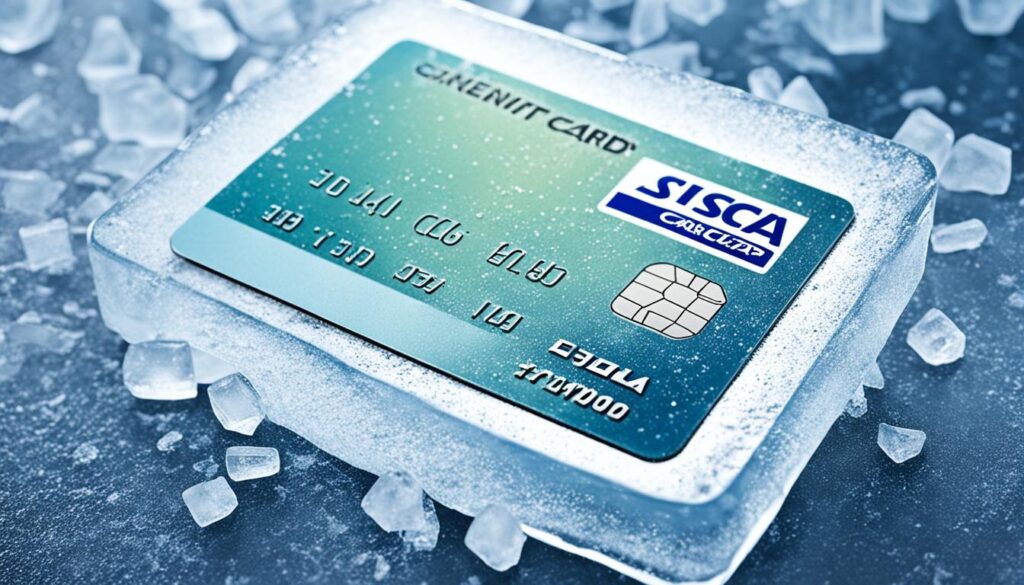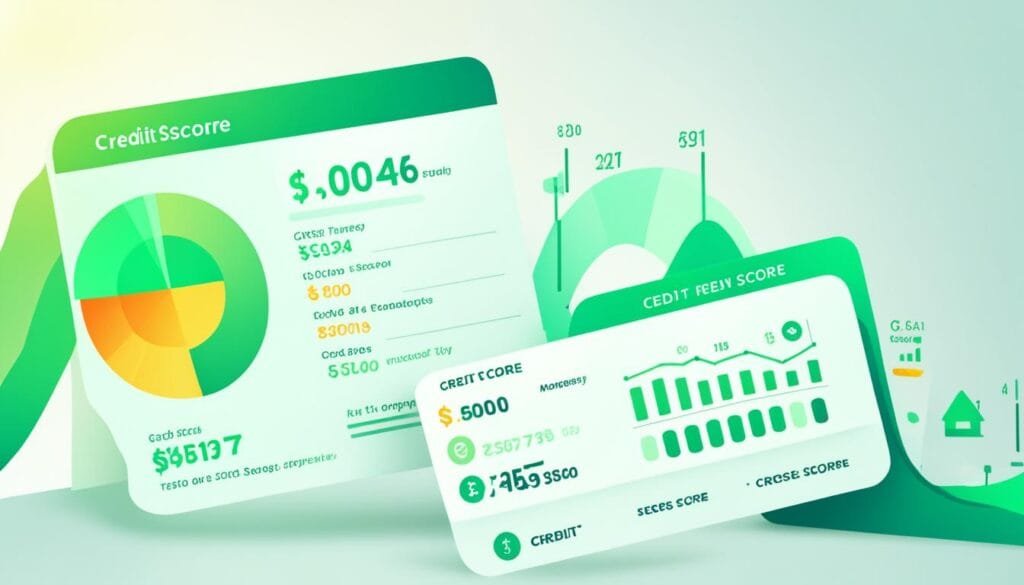A credit freeze, also known as a security freeze, is a measure that allows individuals to limit access to their credit reports. It is particularly useful in protecting against identity theft and fraudulent credit accounts. Before initiating the credit freeze process, there are essential things to consider and alternatives to explore.
Key Takeaways:
- A credit freeze restricts access to your credit reports, preventing unauthorized credit accounts from being opened in your name.
- Before freezing your credit, weigh the potential inconvenience against the need for heightened security.
- Contact each of the three major credit bureaus (Experian, TransUnion, and Equifax) to initiate the freeze.
- A credit freeze does not impact your credit score or existing credit accounts.
- While a credit freeze provides added protection, it is not a foolproof solution and should be combined with regular credit monitoring and vigilant practices.
Before You Freeze Your Credit
Before considering a credit freeze, it is essential to understand the process and its implications. A credit freeze, also known as a security freeze, is a powerful tool that restricts most lenders and service providers from accessing your credit reports. By doing so, it serves as a proactive measure to prevent unauthorized credit accounts from being opened in your name, protecting you from identity theft and financial fraud.
However, it’s important to recognize that while a credit freeze enhances security, it can also present certain inconveniences. When you freeze your credit, you will need to lift the freeze temporarily or permanently whenever you apply for new credit. This process may involve contacting each of the three major credit bureaus—Experian, TransUnion, and Equifax—and following their specific procedures.
When deciding whether to freeze your credit, carefully weigh the advantages of increased security against the potential need to temporarily lift the freeze when applying for new credit. It’s crucial to consider your personal circumstances and determine the level of protection that aligns with your financial goals and peace of mind.
By fully understanding the credit freeze process and its implications, you can make an informed decision about protecting your financial well-being and personal information. In the next section, we will delve into the step-by-step process of freezing your credit for free. Stay tuned!
How to Freeze Your Credit for Free
Freezing your credit is a straightforward process that can be done for free. To initiate the credit freeze, you will need to contact each of the three major credit bureaus: Experian, TransUnion, and Equifax. By following the steps below, you can ensure the security of your credit report:
- Begin by contacting Experian, one of the leading credit bureaus. You can visit their website or call their dedicated freeze hotline to start the process.
- Provide the necessary personal information, including your full name, Social Security number, date of birth, and current address.
- Answer any identity verification questions that Experian may ask to confirm your identity and ensure the security of your credit report.
- Repeat the process with TransUnion and Equifax, contacting each credit bureau individually to initiate the credit freeze.
- Keep in mind that freezing your credit with one bureau does not automatically freeze it with the others. It is crucial to reach out to each bureau separately to ensure full protection.
Once you have successfully frozen your credit, your credit report will remain inaccessible to most lenders and service providers until you lift the freeze. This added layer of security helps prevent unauthorized individuals from opening new credit accounts in your name.

Remember to keep relevant information, such as PINs or confirmation numbers, in a secure location. In the event that you need to temporarily or permanently lift the freeze, you will need these details to complete the process.
Does a Credit Freeze Affect Your Credit Score?
A credit freeze is a powerful tool to protect your financial security, but you might be wondering how it impacts your credit score. Rest assured, a credit freeze does not have any impact on your credit score. It is a precautionary measure that restricts access to your credit reports by lenders and service providers, but it does not affect the factors that determine your creditworthiness.
Furthermore, a credit freeze does not have any impact on your existing credit accounts. Your payment history, utilization rate, and other factors that contribute to your credit score remain unchanged.
However, it’s important to note that if you apply for new credit while your credit is frozen, you will need to lift the freeze temporarily or permanently to allow access to your credit report. This is a necessary step for lenders to assess your creditworthiness. It’s crucial to consider the timing of credit applications to ensure a smooth and efficient process.
Now that you understand that a credit freeze does not affect your credit score, you can confidently take advantage of this security measure to safeguard your financial well-being.
A Credit Freeze Is Helpful but Not a Cure-All
While a credit freeze provides an additional layer of protection against identity theft and fraudulent credit accounts, it is important to understand its limitations. A credit freeze primarily restricts access to your credit reports, making it harder for identity thieves to open new credit accounts in your name.
However, a credit freeze does not prevent other forms of identity theft or fraudulent activity on existing accounts. It is crucial to remain vigilant and take necessary precautions to maximize your protection. Here are some key points to keep in mind:
- Regularly monitor your credit reports: Even with a credit freeze in place, it is essential to monitor your credit reports for any suspicious activity. Check your reports from each of the three major credit bureaus, Experian, TransUnion, and Equifax, to ensure accuracy and identify any potential signs of fraud.
- Stay vigilant: Be cautious of phishing scams, identity theft attempts, and fraudulent activities targeting your personal information. Avoid sharing sensitive data online or over the phone unless you have verified the legitimacy of the request.
- Take necessary precautions: In addition to a credit freeze, consider other protective measures such as strong passwords, two-factor authentication, and regularly updating your contact information with financial institutions.
Remember, a credit freeze is a valuable tool in safeguarding your credit, but it is not a foolproof solution. By combining a credit freeze with proactive monitoring and ongoing security measures, you can significantly reduce the risk of identity theft and protect your financial wellbeing.
| Pros | Cons |
|---|---|
| Provides added protection against identity theft and fraudulent credit accounts | Does not prevent other forms of identity theft or fraudulent activity on existing accounts |
| Offers peace of mind knowing that lenders generally cannot access your credit reports without your consent | May cause inconvenience when lifting the freeze for legitimate credit applications |
| Can be easily implemented and is free of charge | Requires individual initiation with each of the three major credit bureaus |
In summary, while a credit freeze is a valuable tool, it should be complemented with ongoing monitoring and proactive security measures. By understanding its limitations and taking necessary precautions, you can enhance your overall protection against identity theft and safeguard your financial reputation.

Credit Freeze vs. Fraud Alert
When it comes to protecting your credit, two popular options are the credit freeze and fraud alert. While they both serve to safeguard your personal information, there are important differences between the two. Understanding these distinctions will help you make an informed decision that best suits your needs.
First, let’s look at the credit freeze process. A credit freeze restricts access to your credit reports, preventing unauthorized individuals from opening new credit accounts in your name. To initiate a credit freeze, you need to contact each of the three major credit bureaus individually – Experian, TransUnion, and Equifax. This process typically involves providing personal information and answering identity verification questions. Once the freeze is in place, most lenders are unable to access your credit reports without your consent.
On the other hand, a fraud alert is a notification you can place on your credit reports, alerting potential lenders to verify your identity before opening new accounts. Unlike the credit freeze, which requires contacting all three credit bureaus, a fraud alert only needs to be placed with one bureau, and they will notify the other two. This option provides a less stringent level of security than a credit freeze but still adds an extra layer of protection.
It’s important to note that a credit freeze and a fraud alert serve different purposes. A credit freeze is useful if you want complete control over who has access to your credit reports and need a higher level of protection. It can be especially beneficial if you have experienced identity theft or are concerned about potential fraudulent activity. On the other hand, a fraud alert is a less restrictive measure that still acts as a deterrent against identity theft.
Which option is right for you depends on your individual circumstances and preferences. If you want to freeze your credit to prevent unauthorized access completely, a credit freeze may be the better choice. However, if you want a less stringent measure that still offers some protection, a fraud alert may be more suitable.
Comparing Credit Freeze and Fraud Alert
| Aspect | Credit Freeze | Fraud Alert |
|---|---|---|
| Contacting Credit Bureaus | Requires contacting all three major credit bureaus individually | Only needs to be placed with one bureau, and they will notify the others |
| Access to Credit Reports | Restricts access to credit reports for most lenders | Does not restrict access to credit reports |
| Level of Security | Provides a higher level of security | Offers a lower, though still significant, level of security |
Ultimately, both the credit freeze and fraud alert are viable options to protect your credit and personal information. Assess your needs, evaluate the potential impact on your financial activities, and choose the option that aligns best with your circumstances.
How Does Understanding Types of Credit Accounts Relate to the Credit Freeze Process?
Understanding the different types of credit accounts is crucial when it comes to the credit freeze process. Whether it’s revolving credit, installment credit, or open credit, knowing the differences can help you effectively manage and protect your credit accounts when implementing a credit freeze.
Conclusion
The credit freeze process is a vital tool for individuals looking to protect themselves against identity theft and fraudulent credit accounts. By understanding how to freeze credit and the limitations of the process, individuals can make informed decisions regarding their financial security.
Implementing a credit freeze involves contacting the three major credit bureaus – Experian, TransUnion, and Equifax – and providing personal information for identity verification. This freeze restricts access to your credit reports, effectively preventing unauthorized credit accounts from being opened in your name.
While a credit freeze is an effective precautionary measure, it is not a foolproof solution. It does not prevent other forms of identity theft or fraudulent activity on existing accounts. Therefore, it is essential to regularly monitor your credit reports and take proactive measures to safeguard your personal information and financial wellbeing.
Ultimately, individuals should consider the credit freeze process as part of a comprehensive strategy to protect their credit and personal information. By combining a credit freeze with other security measures such as monitoring credit reports and setting up fraud alerts, individuals can significantly reduce the risk of falling victim to identity theft.
FAQ
What is a credit freeze?
A credit freeze, also known as a security freeze, is a measure that allows individuals to limit access to their credit reports to prevent unauthorized credit accounts from being opened in their name.
How does a credit freeze work?
A credit freeze restricts most lenders and service providers from accessing your credit reports, but it can be lifted temporarily or permanently when you apply for new credit.
What is the process to freeze my credit?
To freeze your credit, you need to contact each of the three major credit bureaus (Experian, TransUnion, and Equifax) and provide your personal information and answer identity verification questions.
Does a credit freeze affect my credit score?
No, a credit freeze has no impact on your credit score or existing credit accounts. However, you need to lift the freeze to allow access to your credit report when applying for new credit.
Is a credit freeze foolproof against identity theft?
While a credit freeze provides an additional layer of protection, it does not prevent other forms of identity theft or fraudulent activity on existing accounts. Regular monitoring and proactive security measures are necessary.
What is the difference between a credit freeze and a fraud alert?
A credit freeze restricts access to your credit reports, while a fraud alert notifies potential lenders to verify your identity before opening new accounts. Unlike a credit freeze, a fraud alert only requires contacting one credit bureau.
What should I consider before freezing my credit?
Before freezing your credit, you should weigh the potential inconvenience of lifting the freeze when applying for new credit against the need for heightened security.

